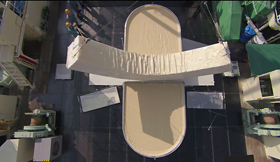
Well, he went down to dinner in his Sunday best
Excitable boy, they all said
And he rubbed the pot roast all over his chest
Excitable boy, they all said
Well, he's just an excitable boy
He took in the four a.m. show at the Clark
Excitable boy, they all said
And he bit the usherette's leg in the dark
Excitable boy, they all said
Well, he's just an excitable boy
I didn’t attend the recent press or invitational screenings for Barney’s new film, Drawing Restraint 9. But both word of mouth and published reports made me feel as if I had seen it – all 135 minutes of it -- even if most reviewers seemed to wish that they hadn’t. Having endured the entire 15 hours of his Cremaster cycle, I could certainly feel their pain. The apple doesn’t fall far from the tree, the flayed blubber of DR9 not far from the descending testicle of Cremaster. Barney’s aesthetic legacy from the earlier film seems to have survived remarkably intact. There is his narcissism, his addlepated attempts at creating a personal mythology, his fetishistic transgressions, his pretentious (and expensive) tropes of fashion, his overreaching symbolism, his staging of inane rituals, his plodding sense of narrative, his artless editing (like boxcars crashing together on rusty tracks) and insipid cinematography. Taken together, they constitute a singular cinematic achievement.
If no one -- least of all your fans, your handlers, and a chorus of High Art hierophants -- lets you know that it’s broke, then why bother to fix it? The art world, which worships power and money above all else, remains awestruck at Barney’s lavish scale of production, envious over his realized ambition, and enthralled with his seemingly unrestrained appetite for spectacle -- even if that spectacle, once the initial shock wears off, proves trite and intellectually unsatisfying. It is the Emperor’s New Clothes in reverse. No one dares to tell the Emperor he’s walking around naked. No one will sit Barney down and mention, quite gently, that inside his expensive external trappings, and his superficial audacity, there is a void.
The plot of DR9, as best I can make out, involves Barney and his real life girlfriend (wife?), the Icelandic pop star Bjørk, as two strangers who arrive, separately, on a large, factory whaling vessel in the Sea of Japan. They are assiduously bathed, groomed, and costumed by a cast of solemn, silent but efficient Japanese servants. The entire ship seems poised to do their bidding. There are props, pageantry and rituals galore. Barney has never seen a parade, nor a vat of refrigerated petroleum jelly, that he didn’t like. Then B + B meet cute, in a tea ceremony, soon followed by some light underwater dining. Using flensing knives, they hack off and consume sushi-sized morsels from each other’s legs, which have miraculously transformed into tail-like appendages redolent of the larger pelagic mammals. The cabin fills with whale oil and blood. Love is strange.
Barney seems to realize that he’s not in Kansas anymore. Kilts, Celtic antecedents, the Agnostic Front, Mormonism, the Chrysler Building, Masonic rites, the Texas two step, Gary Gilmore, Richard Serra – the touchstones of his overheated Cremaster symbolism – would be out of place in the Far East. So, as a respectful “guest” in a foreign land, it’s no “occident” that he falls back on kitschy Orientalia. Were I not just a simple gaijin, I might resent the cliches of Japanese culture and character he offers up: the (geisha like) devotion to quiet, unobtrusive service, the (seppuku like) equation of love and death, the discipline of the (zaibatsu corporate) assembly line, the solemn tea ceremony, the sushi. When Barney trivializes elements of his own culture into bits of unconvincing esoterica, that’s one thing. When he applies it to a foreign culture, it can smack of racism.
But then again, I didn’t actually see the film. Perhaps you didn’t as well. For us, that leaves a concurrent show at Gladstone Gallery, which opened to huge crowds last Thursday. The acolytes, the scoffers, the star struck, the merely curious. They all showed, and lined up like cattle on West 24th Street, which had not seen the like since…well, since Damien Hirst’s opening at Gagosian last year.
It prompted some idle speculation on my part. In last Sunday’s NY Times Arts & Leisure, Barney describes casting himself and Bjørk as a Ready-Made solution for DR9, since he admits not knowing how to direct actors. So what if they decide to leave the whaling business, go west, and buy a ranch? They could call it the Bar Double B. Given their propensity for ritual self-mutilation, and the heedless adoration of their herd of fans (another Ready-Made waiting to be exploited?), it should not be particularly difficult to extend the ritual into a group branding. With their acolytes proudly sporting B|B, BB, or B--B on their rumps, or perhaps Barney’s signature emblem, a long oval bisected by a horizontal line. It was his Cremaster logo, and reappears as his symbol of Drawing Restraint: the lozenge held down by the line.

A cattle brand is an early version of the corporate logo, something that Barney has flirted with throughout his career. I reviewed his first show at Gladstone in 1991, when the gallery was still in SoHo. (This was in pre-Internet days. There is no link to the text.) He then had a fixation on Jim Otto, center for the Oakland Raiders, who played football with a plastic, prosthetic knee joint, and whose jersey number was 00: twin naughts on a field of Raider black. Barney, an athlete turned aesthete, was a graduate of Yale with a football scholarship in his recent past. In that first show, he referenced 00 and 0TT0 frequently in his titles, and in the work. I called it “the origin of pigskin conceptualism”. Although this was several years before the first Cremaster film, Barney’s tendency to myth, and to glyph, was already quite evident. As was his use of petroleum jelly and plastic: the glue of sports medicine, the stuff of prosthetic surgery.
I arrived in Chelsea last Thursday afternoon to view several other shows in progress (including Nan Goldin’s poignant, visceral, if sometimes manipulative, memorial to her sister at Matthew Marks). Anticipating the crush, I dared to enter Gladstone around 4:15 pm for a preview of Barney. One of the gallery slaves immediately scurried over and informed me that they were still installing the work, which was not yet ready to be viewed, and would not be ready until 5:30. Fine with me. But as I was leaving, I noticed a small number of collectors and museum people peeping about undisturbed –- special friends, no doubt. It gave me pause. I certainly hoped the gallery was as forthcoming with them about the unfinished nature of the work on display.
When I returned at 5:45, it was already starting to get uncomfortably crowded, but no line had yet formed at the door. So I popped in for a very quick look, at what could be seen as either film sets or room sized sculptures and installations, constructed of thermoplastic, petroleum jelly and other white and off-white material, punctuated with various nautical motifs (like ropes, bulkheads and deck lights). It had a post minimal riff, kind of like Robert Morris gone to sea. Sometime in the next month I will try to return, and view it under less stressful circumstances, with (hopefully) no further restraint.

tell it like it is
The first honest analysis I've read concerning Matthew Barney and his work. Kaplan's recent writings are on fire. Bravo!